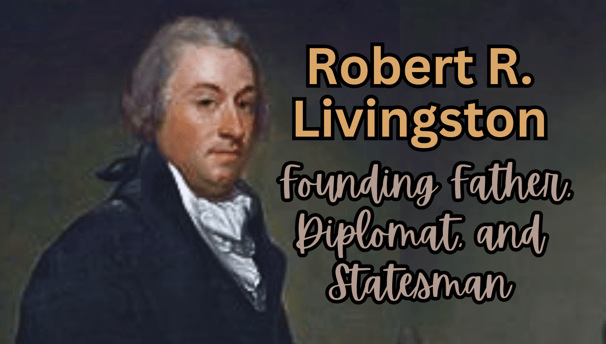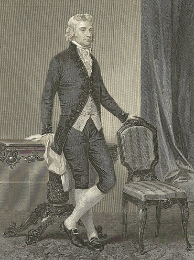Robert R. Livingston: Founding Father, Diplomat, and Statesman
Robert R. Livingston (November 27, 1746 – February 26, 1813), widely referred to as "The Chancellor," was a pivotal figure in the founding of the United States. An accomplished lawyer, politician, and diplomat, Livingston played a critical role in shaping the young nation. His career spanned several decades and included drafting the Declaration of Independence, administering George Washington's first presidential oath, and negotiating the Louisiana Purchase. This article delves into Livingston's life, contributions, and enduring legacy as one of America's Founding Fathers.
Casey Adams
2/11/20253 min read


Early Life and Family Legacy
Robert R. Livingston was born into one of the most prominent families of the Hudson River Valley in New York.
He was the eldest son of Judge Robert Livingston and Margaret Beekman Livingston, whose union brought together two influential and wealthy colonial families.
Livingston had eight siblings, several of whom became prominent figures in their own right.
His brother Edward Livingston served as U.S. Secretary of State and Minister to France, while his sister Janet Livingston married General Richard Montgomery, a hero of the American Revolutionary War.
Another sister, Alida Livingston, married John Armstrong Jr., who succeeded Livingston as U.S. Minister to France.
This interconnected network of influential relatives positioned the Livingston family as a political and social powerhouse in early America.
Livingston's paternal lineage is traced back to Robert Livingston the Elder, the first Lord of Livingston Manor, and Alida Schuyler, a member of another influential New York family.
This illustrious ancestry deeply shaped Robert R. Livingston's life and career, providing him with the education, connections, and wealth necessary to emerge as a leader during the American Revolution.
After graduating from King’s College (now Columbia University) in 1765, Livingston pursued a legal career and was admitted to the bar in 1773.
Tensions within his extended family marked his early years, but these personal disputes did not hinder his rise to prominence in New York’s political and legal circles.
Political Career and the Revolutionary Era
Role in the Declaration of Independence
As tensions between the American colonies and Britain escalated, Livingston aligned with the Patriot cause.
In 1776, he was appointed to the Committee of Five tasked with drafting the Declaration of Independence, alongside Thomas Jefferson, John Adams, Benjamin Franklin, and Roger Sherman.
Although Livingston contributed to the discussions and drafting process, his role was cut short when New York recalled him before the Declaration was signed.
Despite this absence from the final act, his contributions to the revolutionary movement were significant.
New York State Chancellor
Livingston’s most enduring title, “The Chancellor,” originated from his 25-year tenure as New York’s first Chancellor, the state’s highest legal office.
In this role, he oversaw critical legal and constitutional matters during the formative years of the Republic.
As Chancellor, Livingston famously administered the oath of office to George Washington during his inauguration as the first President of the United States on April 30, 1789, a moment etched in American history.
Diplomatic Achievements:
The Louisiana Purchase
One of Livingston’s crowning achievements came during his tenure as U.S. Minister to France (1801–1804).
Appointed by President Thomas Jefferson, Livingston negotiated the Louisiana Purchase, doubling the size of the United States and securing control of the Mississippi River.
This monumental acquisition, finalized in 1803, is widely regarded as one of the most significant land deals in history.
Livingston worked closely with James Monroe during the negotiations, navigating complex diplomatic waters to secure the territory from Napoleon Bonaparte’s France.
The Louisiana Purchase not only expanded the nation's geographic boundaries but also solidified its position as an emerging power on the global stage.
Livingston’s foresight and persistence were instrumental in this landmark deal.
Other Contributions and Legacy
The American Philosophical Society
In addition to his political and diplomatic roles, Livingston was elected to the American Philosophical Society in 1801.
This esteemed organization fostered intellectual exchange and innovation, reflecting Livingston’s broad interests beyond politics.
He was an advocate for scientific advancement and technological innovation, including early support for the development of steamboat technology alongside inventor Robert Fulton.
Family and Personal Life
Despite his professional successes, Livingston’s personal life was marked by tensions within his extended family.
Known for frequent quarrels with relatives, Livingston nevertheless maintained strong connections with his siblings, many of whom held influential positions in American society.
Livingston married Mary Stevens, daughter of John Stevens, a wealthy landowner and politician.
The couple had several children, continuing the Livingston family’s legacy of prominence and public service.
Enduring Impact on American History
Robert R. Livingston’s multifaceted career as a lawyer, statesman, diplomat, and intellectual cemented his place as one of the most influential Founding Fathers.
From his early role in drafting the Declaration of Independence to his instrumental work on the Louisiana Purchase, Livingston’s contributions were foundational to the success of the United States.
Although he is often overshadowed by figures like Jefferson and Franklin, Livingston’s influence on the legal, political, and territorial development of the nation remains profound.
His legacy as “The Chancellor” endures as a testament to his dedication to justice, diplomacy, and the American ideal.
Conclusion
Robert R. Livingston was a man of vision, intellect, and determination.
His efforts in shaping the young United States—whether through his legal acumen, diplomatic skill, or commitment to innovation—ensure his place in the annals of American history.
As a Founding Father, he left an indelible mark on the nation, embodying the principles of liberty, unity, and progress that continue to define the American spirit.
Robert R. Livingston



